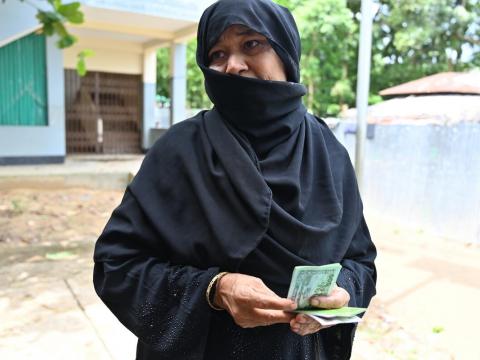USAID EFSP-funded cash assistance helps Bangladeshi elderly, widows cope with COVID-19 economic fallout

Mahmuda burst into tears when she heard the news. This 58-year-old mother of four sons hadn’t cried for joy in a very long time.
“I did nothing to earn this money,” said Mahmuda, sobbing in disbelief as she counted and recounted the nine crisp bills in her hand totalling 4,500 taka (USD 56). “My husband is very sick. I will buy medicine for him and myself with some of this cash. We will spend the rest on food.”
Mahmuda is one of 5,229 people identified following the criteria of the EFSP in Ukhiya and Teknaf, areas of southern Bangladesh, as being especially vulnerable during the COVID-19 crisis.
They received one-time unconditional cash support of 4,500 takas as part of an initiative funded by USAID’s Food for Peace Emergency Food Security Program, which is implemented by World Vision.
The goal of this innovative programme is to improve the food security and nutritional status of 5,229 vulnerable host community households and 34, 112 Rohingya households who live nearby in the world’s largest refugee camp. Equipping people with knowledge and know-how is central to the project, helping them to improve their food security today and in the future. Participants learn about good nutrition, homestead gardening so they can grow their food, and savings and money management skills to enable them to stretch their food budget further.
Households given priority for the unconditional cash support included those with no able-bodied member to participate in cash-for-work activities, pregnant women-headed households, persons living with disabilities, the elderly, households with a chronically-ill adult, children-headed households, landless people or living in houses that are 809.2 square metres or less, those with income irregularities and having a single source of income. Candidates must be permanent residents in the village for at least one year.
“One month back, World Vision called me to attend a meeting, but because of my back pain, I couldn’t go,” recalled Mahmuda, tears still streaming down her face.” When Mahmuda was later called to come to the cash distribution, she thought it was to register for a cash-for-work project. She was willing to work, but is unable because of her poor health.
Mahmuda and her family need the support she received through the programme. Mahmuda and her husband, Alom, 70, struggle to make ends meet daily. Three of the couple’s four sons are married and live apart; they live with their youngest son, Shamsul, 22, a university student.
The funds that Mahmuda and her neighbours received total 21,627,000 takas (USD270,338) will help ease the pressure of rising costs due in part to the influx of 700,000 Rohingya refugees from Myanmar into their community, beginning in August 2017.
Residents in this area welcomed the refugees as they surged across the border. They carried food from their tables onto the streets to feed families who hadn’t eaten for days. Although already one of the country’s most impoverished communities, they didn’t count the cost of caring.
Following the influx, the 500,000 residents in the host communities bordering the camps have borne much of the socio-economic brunt of the influx. Today, refugees constitute more than a third of the local population. According to a recent UNDP report, the cost of daily essentials in this area has risen by about 50 per cent, while wages of day labourers have decreased. Some 2,500 households have fallen below the poverty line.
The COVID-19 crisis has made host community residents even more vulnerable. According to a recent World Vision assessment report, 95% of the household livelihoods activities have been affected; 90% of the households’ survey report reduced income; 95% of households reporting having none or inadequate food stocks.
Mahmuda received vegetable seeds and gardening tools that World Vision distributed for improving food security and nutrition status for vulnerable community people. She also received messages on COVID 19 from WV’s Facilitators to keep themselves protected and safe.
Like Mahmuda, Laila, 47, was ecstatic to receive the much-needed cash support. She works three jobs to provide for Bahsir, 60, her blind husband, and two of their six children still living at home.
Married at age 17, Laila says she and her family enjoyed a prosperous family until two years ago.
“When I got married, child marriage was prevalent and normal in my village. The perception of people was that a girl’s only job is to get married and take care of her husband’s house. However, I lived happily at my father-in-law’s house,” recalls Laila. “My husband owned a small tea stall and was a farmer. He was an active, hardworking man. When our children grew up and married, our economic situation was good.”
All that changed two years ago says Laila. “My husband became very ill. The doctor declared him blind, and as he got older, he became completely blind. When we learned that he also had an ulcer, I broke down mentally. He was the only wage earner in our family. I had no way to pay for his treatment.”
To support Bashir and her children, Laila works three jobs, earning less than USD10 a day. “I work as a housemaid in the morning and the evening at a tea stall. Sometimes, I work as a day labourer on a betel leaf farm where I get 400 taka (USD5) a day. Work on the farms is not available every day; I earn 100 taka (USD1.20) a day in the tea stall or as a housemaid. It’s difficult to manage a family.”
Laila has big investment plans for the money she received. “I will buy (rice) paddy plants to plant on some arable land to grow food for my family,” says Laila. “This money is a real blessing to me.”
Story by: Xavier Sku/World Vision